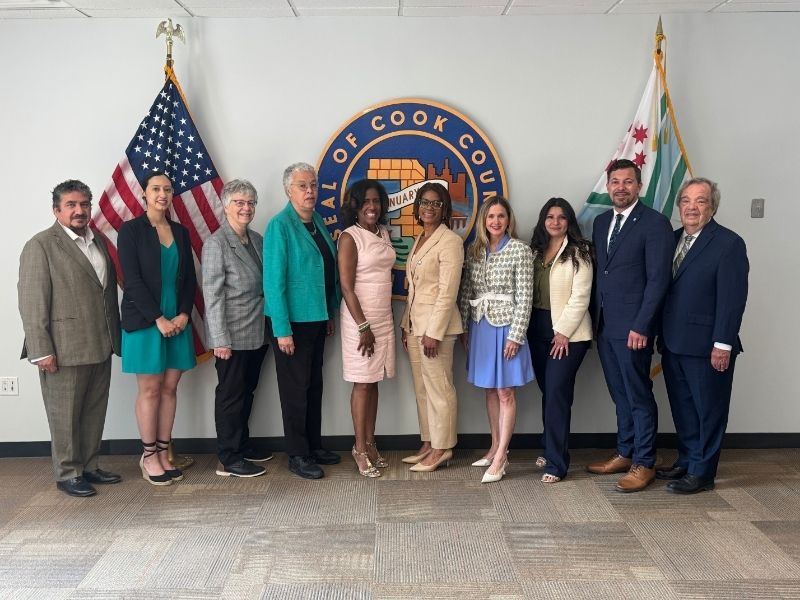Photo Courtesy of Nappy.Co
In Chicago, your zip code can shape how you live—and how you die.
Where you live often dictates whether you’ll have access to decent housing, healthy food and stable employment. On the South and West Sides, many residents still struggle to secure those basics. But when it comes to Black maternal health, the disparities go beyond geography and income.
And it’s time more men become aware of this alarming trend.
Black women are dying during pregnancy, childbirth or postpartum at rates that education, wealth or address can’t even explain.
“This is happening to Black women no matter where they are,” said Cook County Commissioner Donna Miller after a recent press conference at the Cook County Building.

From L-R: Commissioner Frank J. Aguilar, Commissioner Jessica Vásquez, Commissioner Maggie Trevor, Cook County Board President Toni Preckwinkle, Commissioner Donna Miller, Cook County Chief Medical Officer Dr. Lauren Smith, Commissioner Bridget Degnen, Commissioner Alma Anaya, Commissioner Kevin Morrison and Commissioner John Daley.
The major reason? Too often, Black women are not being heard by their doctors. A product of the inherent bias within the healthcare system, where medical professionals fail to deliver culturally responsive care.
“Doctors are not listening to women,” Miller said. “Doctors are not understanding their concerns or taking their concerns seriously.”
In many cases, nurses don’t listen.
Former tennis star Serena Williams, who had a near-death experience following the birth of her daughter, Alexis, is a famous example. After having trouble breathing, Williams alerted a nurse that she was having a pulmonary embolism. But the nurse assumed she was experiencing confusion from pain medication. If it weren’t for the CT scan that revealed several small blood clots in her lungs, Williams might have died.
If the threat of maternal mortality can impact a person of her stature, worth hundreds of millions, with access to the best healthcare in the world, how much more does it affect the lives of everyday Black women?
***
Miller recently introduced a resolution declaring maternal mortality and morbidity a public health crisis in Cook County. It’s a preventable crisis and a moment for Black men to show up for the pregnant people in their lives: spouses, partners, sisters, cousins, friends.
“Anyone pregnant should have someone be alongside them at any point in their pregnancy, so they can help hear what you’re hearing when you’re pregnant,” she said.

Cook County Commissioner Donna Miller with Cook County Board President Toni Preckwinkle (Photo Courtesy of Cook County Gov’t.).
The U.S. has some of the most advanced hospitals in the world. But no wealthy nation has worse maternal outcomes.
According to the CDC, the maternal mortality rate in the U.S. was 18.6 deaths per 100,000 live births in 2023. That’s down from 22.3 the year before—but still appalling.
Now consider the rate for Black women in 2023: 50.3 deaths per 100,000 live births.
Compare that to Norway, which had zero maternal deaths, and Switzerland had just over one per 100,000 live births.
“This is unacceptable,” said Cook County Chief Medical Officer Dr. Lauren Smith at the press conference. “And this is why it is incredibly important that we continue to invest in women’s health.”
Cook County is doing just that. In a major step led by Commissioner Miller, the county now offers free doula care to patients at any stage of their pregnancy at its hospitals.
Doulas provide support before, during and after childbirth. Statistics show their presence can be invaluable, leading to shorter labors, fewer cesarean sections (C-sections) and better health outcomes for mothers and infants.
Miller said doulas provide vital support and serve as another pair of eyes and ears, “trained to do what’s in the best interest of the birthing mother.”
Added Cook County Board President Toni Preckwinkle, “This is progress to be proud of, but maternal health is a shared responsibility. It takes hospitals, public health experts, elected leaders, nonprofits, faith, communities and neighbors.”
In other words, doulas are just part of the solution.
What’s also needed is someone who loves the pregnant person enough to be present at every doctor visit and be their fiercest advocate.
“You might not be listening to every single word, and the doctor might not be asking all the right questions,” Miller said. “So, someone needs to be there to say, ‘Hey, what about this? What about that? Or I read this. What’s the answer to that?’”
Doing so can help save lives and make pregnancy, from prenatal to postpartum, the positive milestone every woman deserves. The Black women in our lives are entitled to this.
